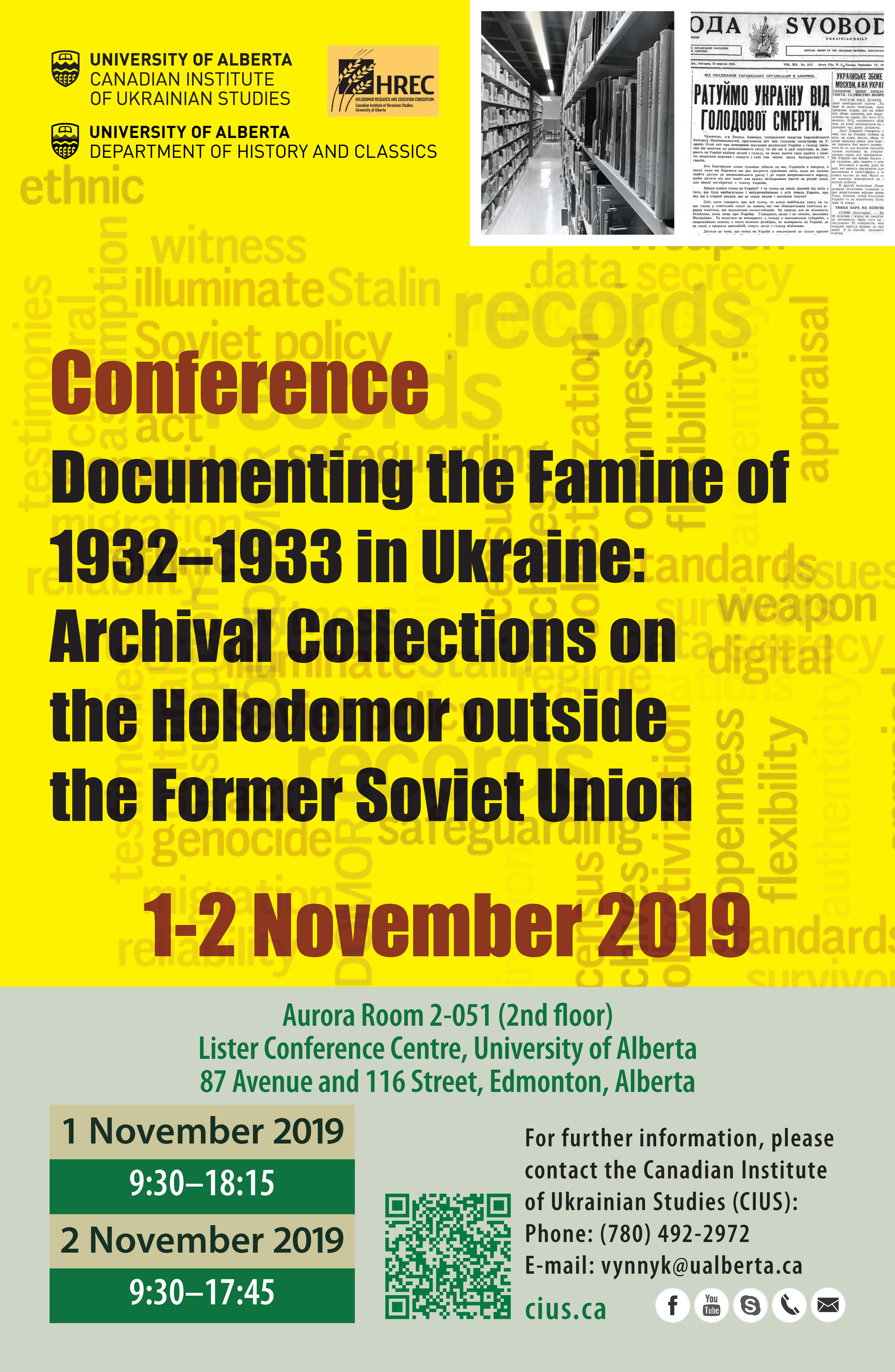
On November 1‐2, 2019, the Holodomor Research and Education Consortium (HREC) at the Canadian Institute of Ukrainian Studies is holding a conference at the University of Alberta in Edmonton to examine materials related to the Holodomor that are found in archival collections outside of the countries of the former Soviet Union. Sources to be discussed at the conference include the archives of foreign governments and diplomatic correspondence, and the holdings of the émigré Ukrainian community as well as of minority groups and communities.
"With this conference, we aim to bring to light lesser known and under-researched sources related to the Holodomor and thus to encourage and stimulate further research and publication based on primary source materials," said Dr. Bohdan Klid, Research Director for HREC.
When Robert Conquest’s The Harvest of Sorrow was published in 1986, scholars did not yet have access to Soviet archives. The first collections of archival materials on the Famine appeared in the second half of the 1980s, based on materials from the ministries of foreign affairs of countries that had diplomatic relations with the Soviet Union in the 1930s, including British, German, and Italian documents. These were followed by the publication of collections from Polish and Romanian archives. With the fall of the Soviet Union, Communist Party and Soviet government archives were opened, and an "archival revolution" commenced that lead to a surge in research on the Holodomor and many publications.
However, there remain diplomatic records as well as collections associated with immigrant and diaspora communities that have yet to be studied and published. Rich sources include materials from the Ukrainian pre-World War II immigrant and post‐World War II émigré communities, as well as from the Mennonite, Jewish, and other émigré communities that were in contact with and sought to aid their compatriots in Soviet Ukraine during the Famine.
A conference keynote address will be given by Ola Hnatiuk, a professor at the University of Warsaw (Centre for East European Studies) and at the National University of the Kyiv-Mohyla Academy (Department of History). Dr. Hnatiuk, who is the recipient of numerous awards and author of several books, including the often-cited Farewell to Empire (2003), will speak on "Reactions of Ukrainians to the Holodomor of 1932-1933 in Interwar Europe: New Discoveries and Sources."
The conference is being organized by the Holodomor Research and Education Consortium at the Canadian Institute of Ukrainian Studies, Faculty of Arts, University of Alberta. Co-sponsored by the Department of History and Classics, Faculty of Arts.
For more information, contact Dr. Oksana Vynnyk (vynnyk@ualberta.ca) or call (780) 492-2972.
PROGRAM
1–2 November 2019
University of Alberta, Lister Centre (Aurora Room)
Day One
9:30–9:45 Conference Opening and Introductory Remarks
9:45–11:45 | Panel One | Representations of the Famine of 1932–33 in the archival collections of émigré minority groups and communities
Chair/Commentator – Myroslav Shkandrij (University of Manitoba)
• Inna Gogina (University of Southern California): "Representations of the 1932–33 Ukrainian Famine in the USC Shoah Foundation’s Visual History Archive"
• Gennady Estraikh (New York University): "The American Yiddish press on the privation of Soviet Ukraine’s peasants"
• Colin Neufeldt (Concordia University of Edmonton): "Perspectives on Soviet collectivization and the Holodomor in Mennonite archives and libraries in North America (1928–34)"
11:45–1:00 Lunch
1:00–2:45 | Panel Two A | The Famine of 1932–33 as reported by diplomats and representatives of foreign governments
Chair – Heather Coleman (University of Alberta)
Commentator – Olga Bertelsen (Embry-Riddle Aeronautical University)
• Paolo Fonzi (Humboldt University of Berlin): "‘A trial of strength against the restive peasantry’: What the Germans knew about the Great Famine in the USSR and how they perceived it"
• Iryna Dmytrychyn (Institut national des langues et civilisations orientales): "Voyage enchanté d’Edouard Herriot"
• Eduard Baidaus (Red Deer College/Lakeland Community College): "Soviet collectivization and the Holodomor in Ukraine: Primary source materials in Romania and Moldova"
2:45–3:05 Coffee Break
3:05–4:40 | Panel Two B | The Famine of 1932–33 as reported by diplomats and representatives of foreign governments
Chair – Volodymyr Kravchenko (University of Alberta)
Commentator – Bohdan Klid (University of Alberta)
• Hiroaki Kuromiya (Indiana University Bloomington): "The Holodomor in light of Japanese historical sources"
• Andrii Bolianovskyi (National Academy of Sciences of Ukraine): "The US and the Holodomor: US State Department documents on collectivization and the Famine in Ukraine, 1929–34"
4:40–5:00 Coffee Break
5:00–6:15 Keynote Presentation
Ola Hnatiuk (National University of "Kyiv-Mohyla Academy" / University of Warsaw): "Reactions of Ukrainians in interwar Europe to the Holodomor of 1932–33: New discoveries and sources"
6:30–9:00 Reception
Day Two
9:30–11:45 | Panel Three | Émigré Ukrainian community archives and collections
Chair/Commentator – Frank Sysyn (University of Alberta)
• Serge Cipko (University of Alberta): "The Holodomor and Canada’s response: Archival findings"
• Bohdan Figol (Ukrainian Canadian Research and Documentation Centre): "Nascent Canadian Holodomor research in Canada"
• Olga Andriewsky (Trent University): "Eyewitness and survivor collections of the early Cold War period (1945–55)"
• Roman Wysocki (Maria Curie-Skłodowska University): "The Ukrainian Bureau in London and its documents related to the Holodomor"
11:45–12:45 Lunch
12:45–3:15 Trip to Edmonton City Hall and Holodomor Monument (1983)
3:15–5:15 | Panel Four | Research in Progress
Chair – Iryna Skubii (University of Alberta / Kharkiv Vasylenko National Technical University of Agriculture)
• Anastasia Leshchyshyn (University of Alberta): "Visualizing the Holodomor: The HREC Online Photo Directory"
• John Vsetecka (Michigan State University): "Toward a social history of the Holodomor: Famine survivor testimonies in the archive of the US Commission on the Ukraine Famine"
• Larysa Zasiekina (National University of Ostroh Academy / Anglia Ruskin University): "The Famine 1932–33 in Ukraine: Gaps in archival collections and memory recollections in East Ukrainian and Mennonite communities"
• Olga Klymenko (University of Alberta): "The Maniak Collection: Making available little-known witness accounts from the 1980s"
5:15–5:45 Closing Remarks
Myroslav Shkandrij (University of Manitoba)
5:45–8:00 Dinner